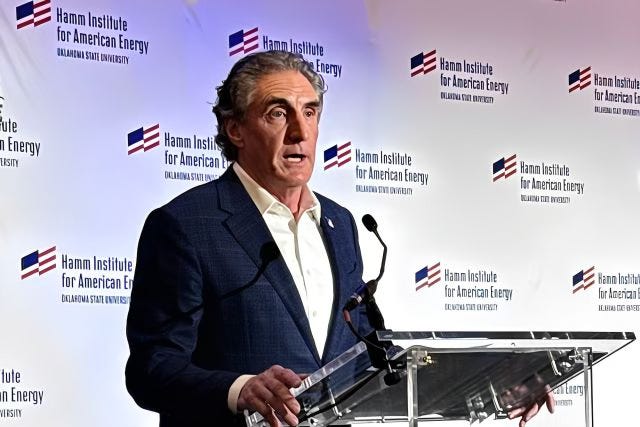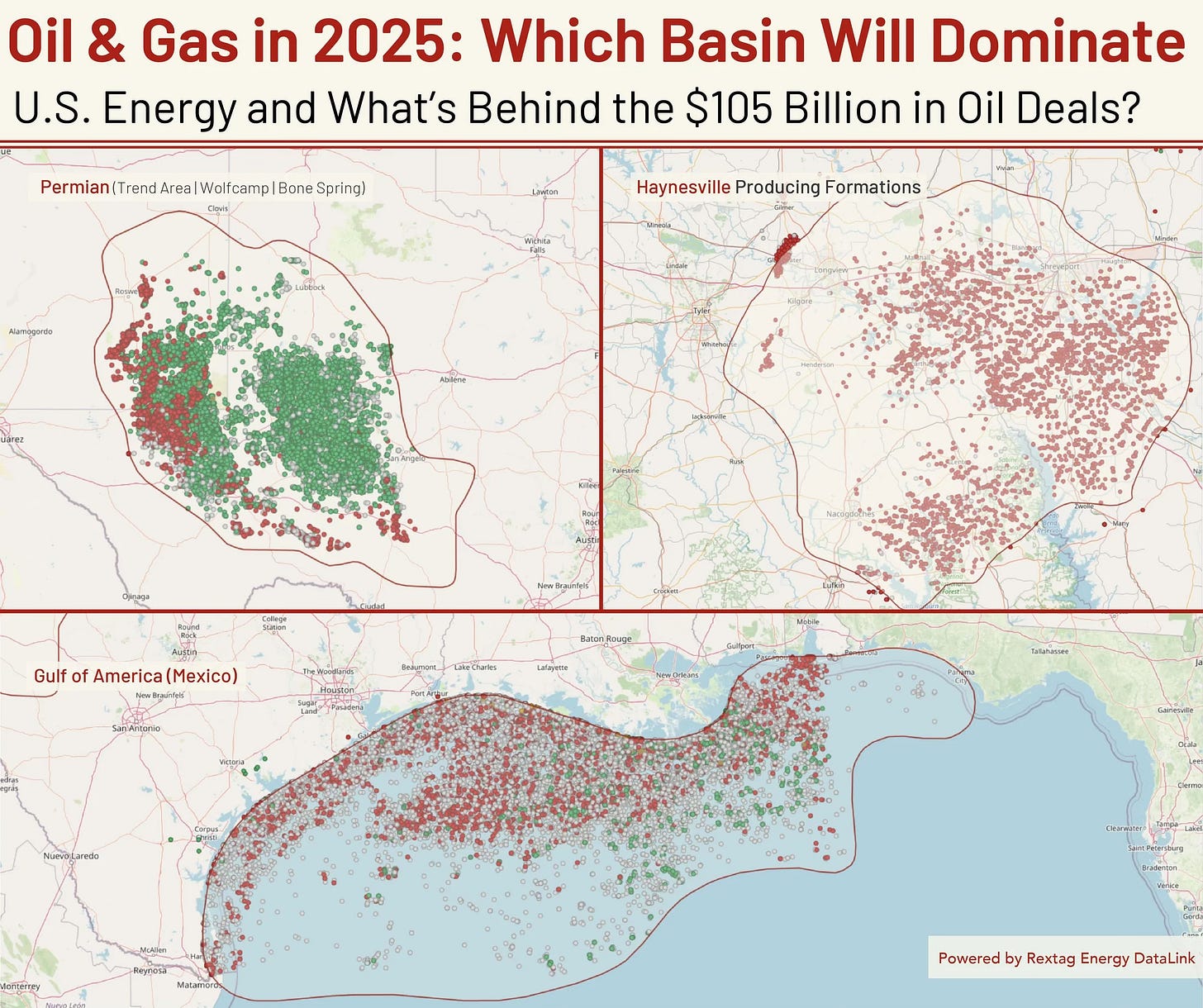Upstream Intel 5/5/25
Mixed signals of industry confidence | Price slump opens M&A market to small producers | Sovereign lease cancellation insurance | New Mexico regulatory burden
Welcome back to Upstream Intel, Lease Analytics’ weekly roundup of our analysis and insights. As always, we would love to hear from you with news ideas, feedback and anything else you find interesting.
Sent this by a friend? Sign up here to receive UIW in your inbox.
Data Drill: Mixed signals
This is the type of news week that shows why we write Upstream Intel. The major business publications ran long-form articles about how oil and the oil sector has taken a beating since January. WSJ ran an analysis to that end with the graph above. Yet un-emphasized on main pages, or in newsletters, was a curious set of mixed signals that showed the oil patch might be afraid, but certainly not panicking:
Rig count rose two consecutive weeks for first time since February as sentiment appears to have “bottomed out.”
Only one deal has been delayed, while billions have been raised by PEs raising cash for new acquisitions.
Demand from airlines and shipping is falling just as big tech companies embrace oil to power their data centers.
Majors’ fortunes diverge on balance sheets and asset bases
Oil majors face their toughest year since the pandemic with profits falling for a third consecutive period. Balance sheet strength now sharply differentiates the companies, with Shell demonstrating resilience by promising to maintain share buybacks even at at $50 oil while Chevron cuts its dividend, and BP appears vulnerable with returns pegged to $71.50 oil — an unwelcome position for the battered company.
Strategic asset portfolios increasingly determine which companies can sustain investor payouts. Exxon leads with Permian Basin and Guyana production growth offsetting weaker prices, allowing $9.1 billion in shareholder distributions despite the downturn. As CEO Darren Woods notes, structural cost-saving measures have positioned the company "to excel in any environment."
Following suit, European majors Total and Equinor have pursued growth through U.S. shale acquisitions, with TotalEnergies expanding in Eagle Ford gas, and Equinor in the Marcellus. These investments in high-productivity assets support TotalEnergies' commitment to $2 billion in second-quarter shareholder returns, despite an 18% profit decline, highlighting how targeted M&A can maintain growth even as broader industry profits retreat.
Sticking the slowdown
Acquisitions keep coming as slump offers land price relief
Small independents are rushing in to pursue acquisitions across U.S. basins despite falling oil prices. This week, EOG acquired core Eagle Ford acreage for $275 million and Orion Diversified closed cash-flow positive purchases in Colorado, Oklahoma, and Arkansas. These moves mirror the strategic positioning seen among larger players as companies race to secure quality assets.
It didn’t take long into this “downturn” for smaller E&Ps, and those that missed the last two years of M&A, to pounce on the opportunity. As Northern Oil and Gas CEO Nick O'Grady noted, cyclical downturns often reset prices higher in future periods, allowing well-positioned companies to deploy capital advantageously.
G&A Isn’t Fat, It’s Insurance: Protecting Your Bottom Line Post-M&A
The pressure to slash post-merger G&A expenses has never been higher amid falling oil prices. However, treating these departments as mere overhead misunderstands their role as operational insurance. Land administration, legal, and compliance teams safeguard against costly errors that can erase any projected savings.
Companies that maintain strategic G&A during downturns protect themselves from expired leases, misrouted payments, and missed deadlines—while positioning for stronger recovery when prices rebound.
Read the full opinion piece by Lease Analytics CEO Tom Agnew
In Other News:

Interior proposes federal repayments for lease cancellations
Interior Secretary Doug Burgum is pushing for the U.S. government to pay financial penalties to energy companies when presidents cancel their projects, Politico reported. The White House's National Energy Dominance Council is developing "sovereign risk insurance" that would force administrations to reimburse companies for capital losses if they revoke permits for pipelines or federal leases - directly addressing fallout from Biden's Keystone XL cancellation that stranded $3 billion in investments.
New Mexico regulatory environment deters operators
E&Ps are reconsidering New Mexico as their regulatory environment becomes more complicated. State agencies grant drilling permits but then make development impossible by blocking essential electricity connections. Meanwhile, southeastern New Mexico faces a critical electricity shortage with utilities, federal agencies, and grid operators all dodging responsibility.
Williston drilling innovation heats up — even as market cools down
Hess Corporation and Chord Energy are innovating in Bakken Shale production with breakthrough 4-mile lateral wells that dramatically cut breakeven costs, Hart Energy reports. The two pioneering Hess laterals in North Dakota's Beaver Lodge Field deliver "significantly reduced" breakeven costs and higher production, while requiring less surface disruption.
Stat of the Week: Dynamic dean formation
+15 million barrels
The amount of oil produced by just 43 wells in tight Dean sandstone, up to 300 ft thick, that sits between Spraberry and Wolfcamp in the Midland Basin.
What We’re Reading:
2%-Plus Gas OFS Deflation if Permian Cuts Rigs, Frac Crews. (Hart Energy)
Expand sticks to production, spending plans and 2026 ramp potential. (Oil and Gas Journal)
Prairie Operating Co. begins completion of 9 DUC wells, acquired from Bayswater in the DJ. (Oil and Gas 360)
Comstock Extends Bcf-Gushing Western Haynesville to 45 Miles Wide. (Hart Energy)
BP struggles: planning $3-4B of divestments this year (Rigzone) after a 48% first quarter profit drop (Reuters)
Energy Secretary Aims to Reassure Oil Bosses Amid Trade War. (Bloomberg)
US Eases Downhole Commingling Policy to Boost Oil Production. (Rigzone)
API Drops Suit After DOI Says Leasing Redo Coming. (Law360)
New Budget Proposal Cuts Clean Energy Funding, Expands Fossil Fuel Research. (Oilprice.com)




